
Do potential employees still find you attractive?
Shifting expectations of workplaces raises the bar for UK employers looking to attract and retain talent.

“By 2030, we can expect a talent deficit of 85.2 million workers across the economies analyzed—greater than the current population of Germany. This global skills shortage could result in $8.452 trillion in unrealized annual revenue by 2030 – equivalent to the combined GDP of Germany and Japan.” (Korn Ferry Study, 2018)
During the preparation for the Economic Forum’s Annual Meeting, the Page Society conducted research, asking its members what they believe are the most critical risks facing businesses in 2023, and here are the results:
As the second-highest risk, challenges related to attracting and retaining employees are high on the business agenda these days.
The pandemic has brought about a profound transformation in employees’ expectations, reshaping their demands and priorities when it comes to where, how, and when to do their jobs.
Employers are now faced with a new landscape where they must navigate these evolving expectations to meet the changing needs of their workforce. CCOs hold a significant responsibility in portraying their companies as desirable employers.
Today, employers face immense difficulties when it comes to attracting and retaining talented individuals. Especially following a period of stagnation brought on by the COVID-19 pandemic, numerous businesses are now entering a phase of growth and expansion.
However, this simultaneous surge in hiring efforts has intensified competition, resulting in a scarcity of skilled professionals in the market.
With the intense rivalry for exceptional talent, brands must go above and beyond to cultivate an image as an outstanding workplace. The ability to be perceived as a great place to work is now a critical differentiator that can significantly impact a brand’s ability to attract and retain top talent.
Overall, not only is there ample evidence that a company’s reputation makes it easier to recruit and attract top talent, it also impacts the business’s bottom line in more than one way.
Here are some examples:
These are just a few of many findings which highlight the profound influence of corporate reputation on talent acquisition, consumer behavior, and overall business success.

Shifting expectations of workplaces raises the bar for UK employers looking to attract and retain talent.
Measuring how talent perceives a company is crucial for organizations to gain insights into their overall attractiveness as an employer, but it’s not always a straightforward journey.
While there are several common methods that help track talent perceptions, it’s important to recognize their limitations.

A commonly used approach is monitoring company reviews and mentions on platforms like Glassdoor or Social Media. While these reviews offer valuable insights, they primarily represent the opinions of individuals who choose to share their experiences online.
This may not provide a comprehensive picture of how the broader talent pool perceives the company. Additionally, relying solely on these platforms might overlook candidates who prefer not to leave public reviews or are not active users of such platforms.
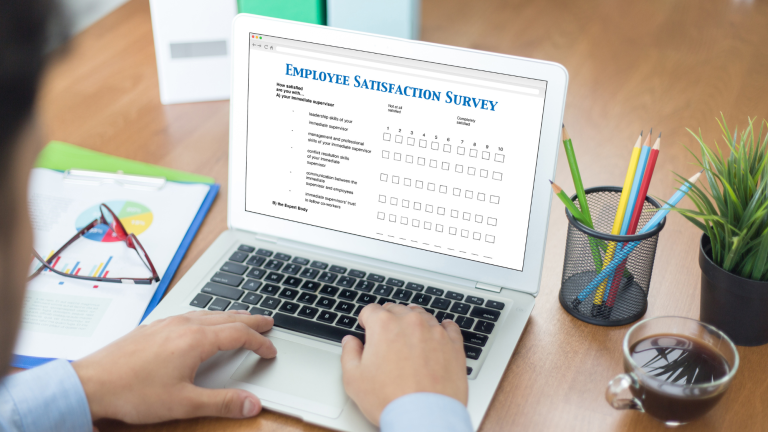
While internal employee surveys can provide valuable insights into the perspectives of existing employees, they don’t capture the perceptions of potential talent who have not yet joined the organization.
Existing employees’ perspectives are also often influenced by their personal experiences and biases, which may not accurately reflect the overall talent perceptions.

Market research often requires substantial time and resources, making it difficult for companies to gather timely insights into evolving perceptions, which may result in delayed detection of shifts in opinions.
Consequently, organizations need to explore more agile and efficient approaches to capture real-time insights and stay ahead of evolving perceptions.
Understanding and measuring employee and talent perceptions can be challenging, but the resulting insights can have a transformative effect on your organisation’s success.
When you grasp their values and expectations, you can strategically align your efforts to fullfill their needs. This powerful understanding empowers you to make informed decisions, foster positive change, and thrive in a competitive business environment.
The benefits of cultivating a strong employer reputation are numerous – here are just some of the examples:
A strong reputation is key to attracting and retaining top-tier candidates seeking reputable and reliable employers, therefore it’s crucial to continue building positive perceptions of your employer brand in order to remain competitive in the battle for talent.
Reputation has a profound impact on employee engagement. When a company is perceived positively for its employer brand, employees are more likely to feel proud, motivated, and connected to their work and the organization as a whole.
Being perceived as an attractive employer minimizes the need for financial incentives to attract candidates, reducing the turnover of existing employees and the likelihood of overpaying for new hires.
Maintaining positive perceptions of your employer brand can expand the talent pool from which your organization can source the candidates, as a staggering 84% of people consider the company’s reputation when applying for the job.
According to a study conducted by Gartner, well-managed employer brands have access to over 60% of the labor market, compared to only 40% for those without a strong employer brand.
Research conducted by LinkedIn shows that an attractive employer brand accelerates the recruitment process, allowing companies to hire one to two times faster as more candidates are reaching out proactively, reducing sourcing time and expediting the entire hiring process.
Employer branding impacts revenue streams as candidates and consumers often overlap. A negative candidate experience can have significant repercussions, as demonstrated by the case study on Virgin Mobile.
Poor candidate experiences resulted in the loss of 6% of their customer base to a competitor, amounting to £4.4 million in revenue.
By investing in building a better employer reputation, organisations can improve their brand image among candidates, employees and consumers, resulting in cost-savings and revenue growth.
In today’s evolving landscape, brands must conduct data-driven reality checks on employee and talent expectations. As the dynamics of the relationship between individuals and companies rapidly change, continuous measurement and assessment are essential.
At Caliber, we recognise the significance of real-time measurement of stakeholder perceptions. Within our research model, one of the core elements is assessing stakeholder willingness to work for a company.
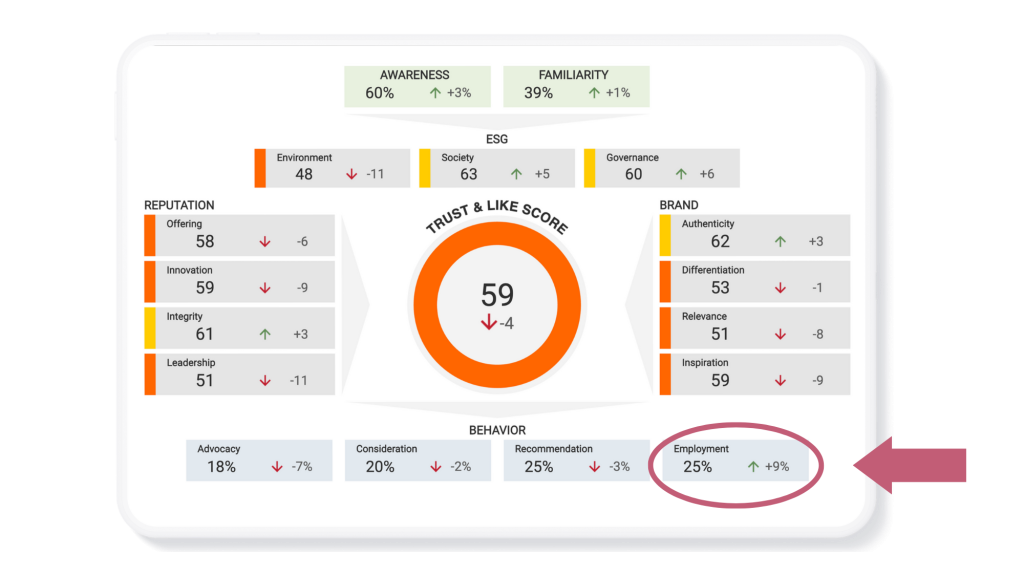
We view this willingness as an outcome or expected behavior influenced by how individuals perceive various attributes associated with the company.
For instance, if survey participants perceive the company’s leadership, integrity, relevance, or ESG activities as lacking, it is highly likely to affect their inclination to consider employment with that organization.
Our platform conducts ongoing surveys, providing real-time visibility into how different aspects of a company are perceived.
What sets us apart from other solutions, such as online reviews, internal surveys, and market research, is our objective and representative methodology.
We go beyond relying solely on vocal online reviewers or active rating sites. Our research captures a broader set of talent segments, which can be further broken down by age, gender, education, profession and more, empowering decision-makers to delve deeper into the perspectives of their most important stakeholder groups, including young talent.
Additionally, our approach is linked to other metrics like Trust & Like Score (TLS), enabling us to identify key drivers and triggers that influence employer attractiveness.
With Caliber’s Perception Tracker, companies gain the knowledge and understanding necessary for crafting powerful strategies that resonate with employees and talent, and drive the brand’s success.
Today Perception Tracker is trusted by numerous global companies to gauge public sentiment toward their brand in specific markets.
In today’s highly competitive talent market, attracting and retaining exceptional employees is a top priority for organisations. The scarcity of skilled professionals and shifting expectations necessitate the development of a strong employer reputation.
The benefits of a positive corporate image are significant, including the ability to attract top-tier candidates, boost employee engagement, streamline recruitment processes, and drive financial success.
While measuring talent perceptions can be challenging, understanding their values and expectations empowers companies to make informed decisions and thrive in a competitive business landscape.
To navigate this landscape effectively, it is crucial to adopt agile and efficient approaches to capture real-time insights. With Caliber’s Perception Tracker, businesses gain actionable knowledge to gauge stakeholder perceptions and strategically enhance their attractiveness as employers.
By taking concrete steps to align with employee expectations, organisations can elevate their talent acquisition and retention strategies, driving tangible results for long-term success.

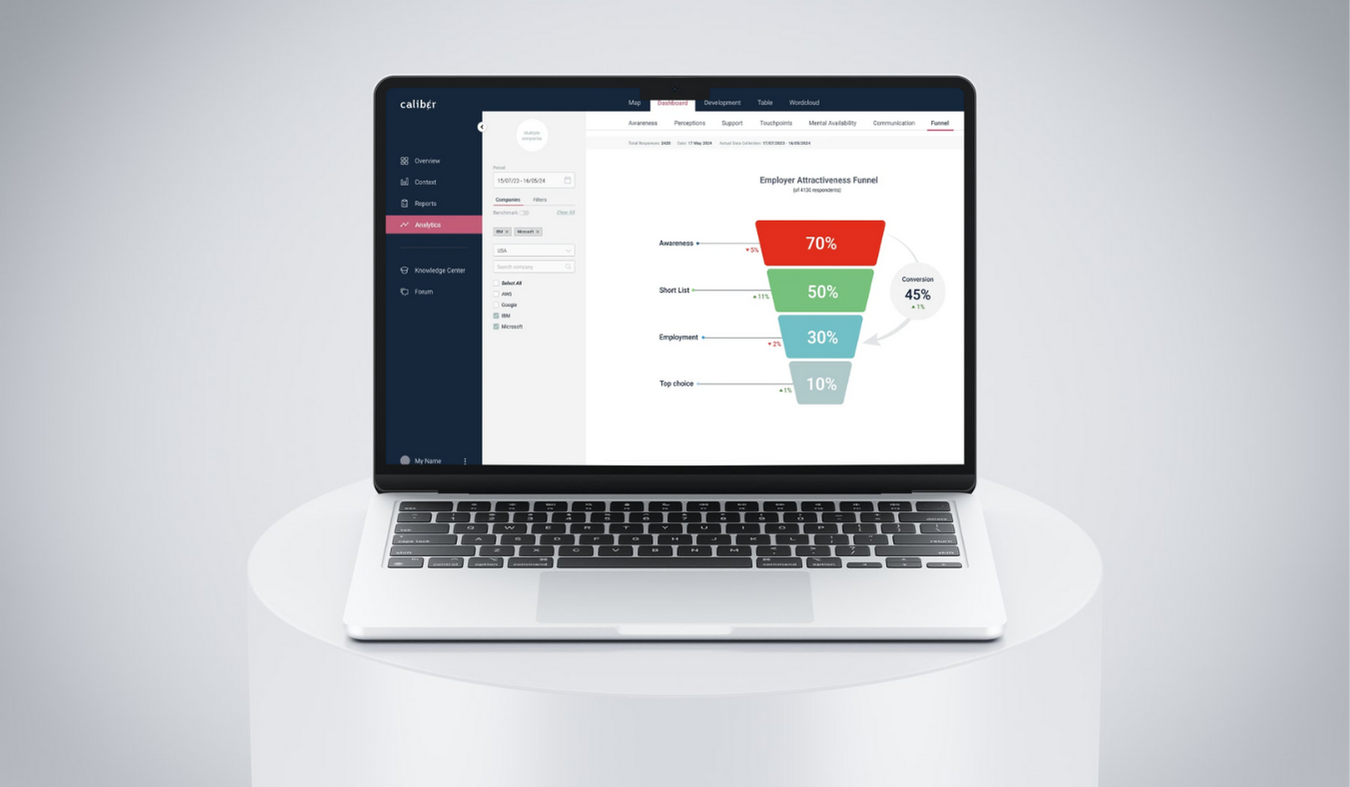
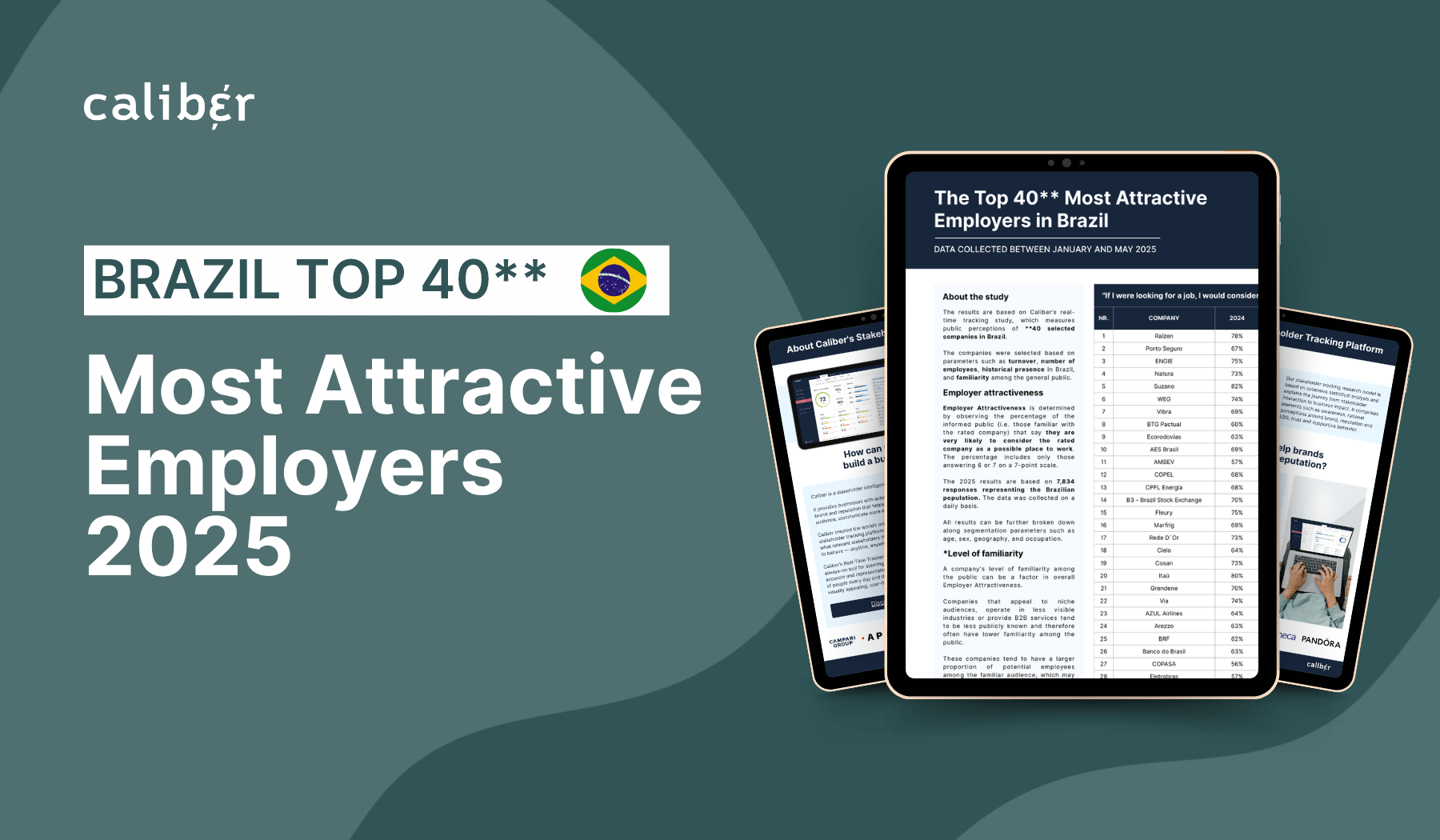
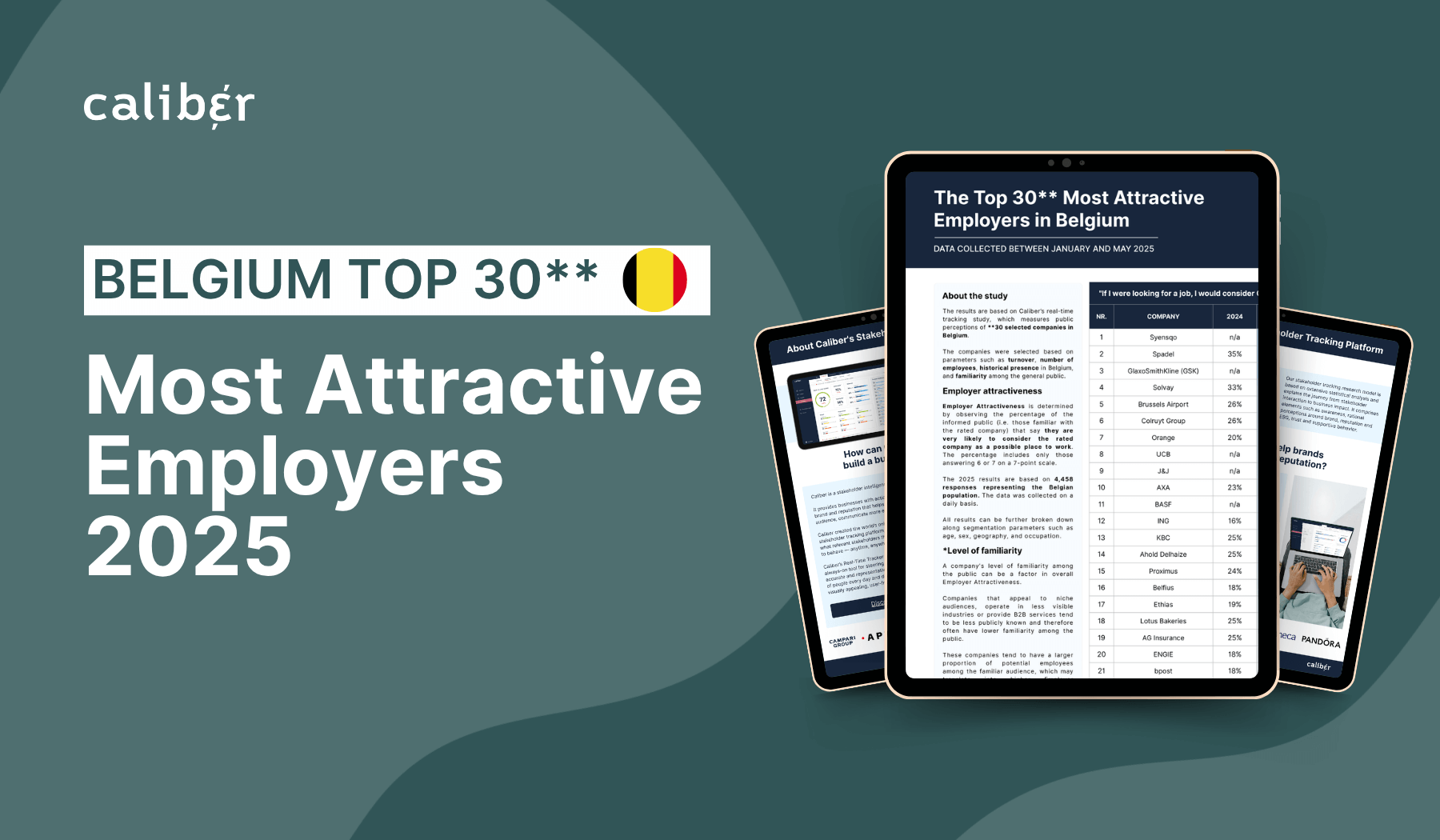
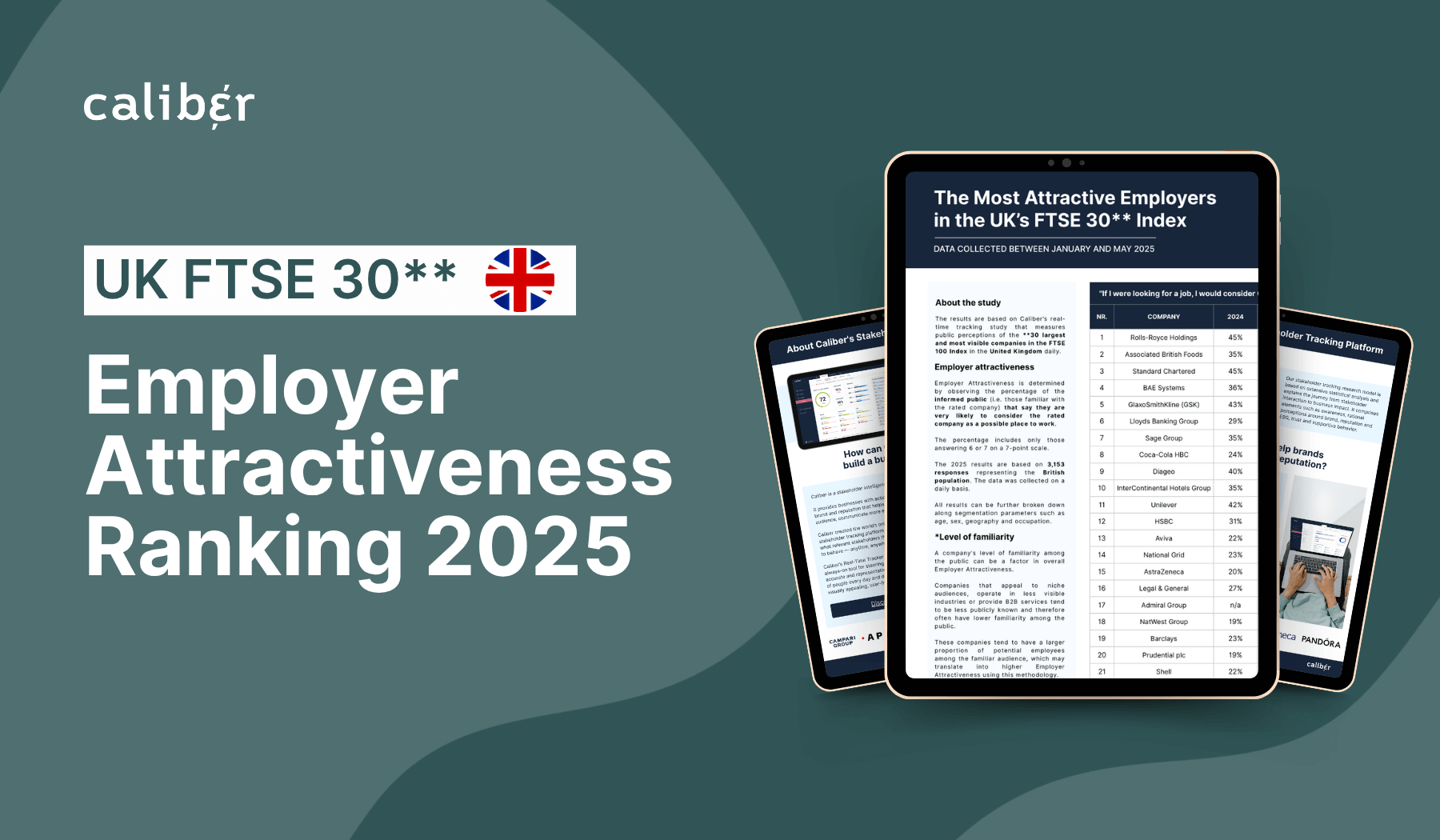
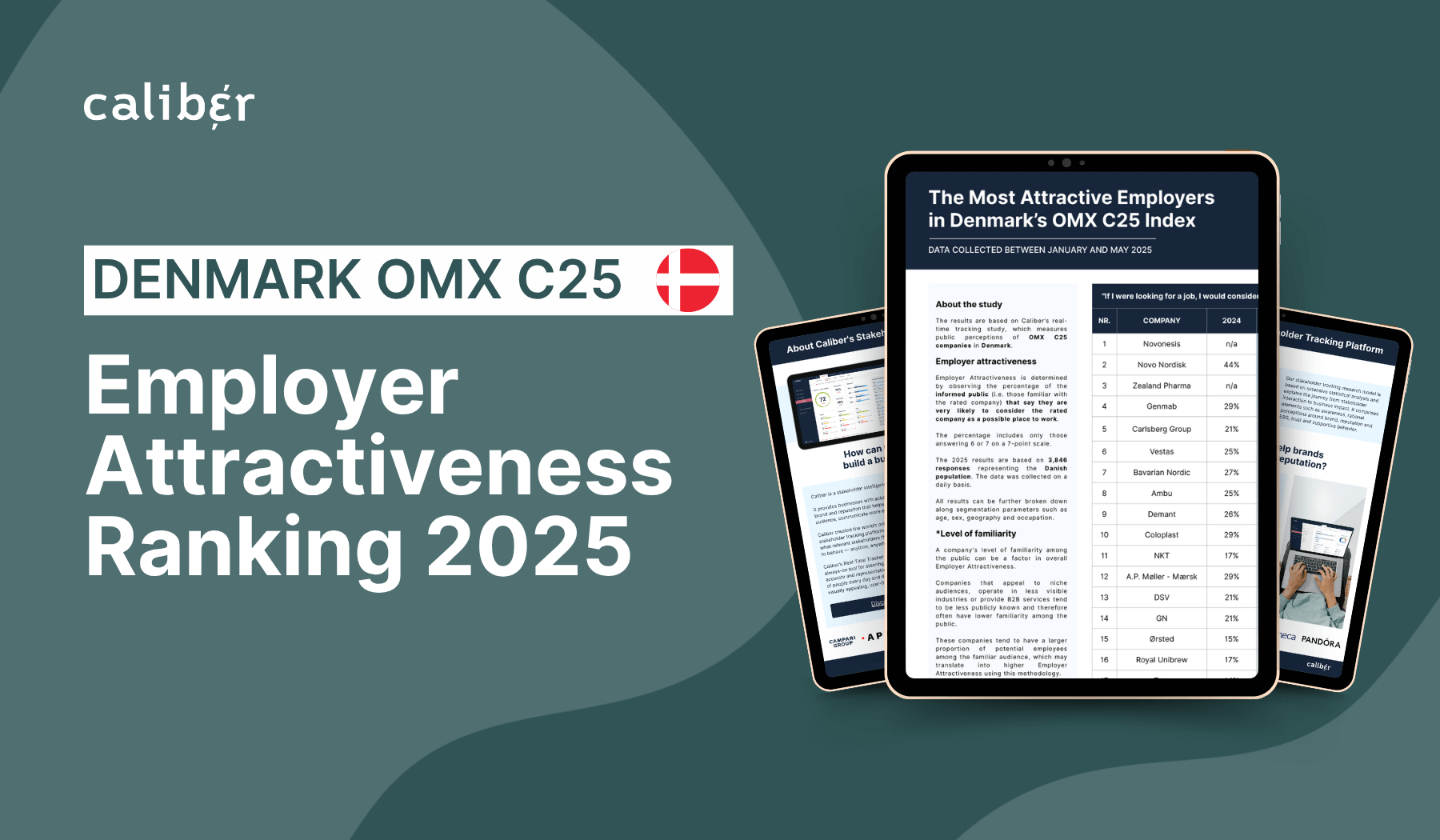
© 2024 Group Caliber | All Rights Reserved | VAT: DK39314320